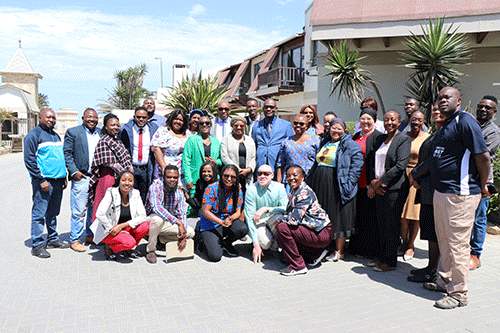George Sanzila
SWAKOPMUND - The United Nations Population Fund (UNFPA) regional SRH/HIV advisor for east and southern Africa, Innocent Modisaotsile has appealed for legal reforms to ensure progress towards universal access to comprehensive sexual and reproductive health (SRH).
He further implored lawmakers to advocate for populations that are left behind noting that these members of society are at high risk of contracting HIV due to lack of access to SRH information and services. Populations left behind have been identified as sex workers, men who have sex with other men, transgender, incarcerated people and persons living with disabilities.
Modisaotsile made the appeal at the ongoing SRH, HIV and AIDS workshop organised by the UNFPA in collaboration with the Southern African Development Community Parliamentary Forum (SADC-PF) and the National Assembly, in Swakopmund.
The aim of the workshop is to ensure that mechanisms are put in place to end discrimination and promote comprehensive access to sexual and reproductive health services through legislation, accountability, oversight on resource allocation and representation.
Modisaotsile reminded members of parliament attending the workshop that fulfilling sexual and reproductive health and rights for the neglected populations was important to achieving sustainable goals and the ideals of the 2030 Agenda for sustainable development.
He noted that even though Namibia has made progress, more still needed to be done to reduce inequalities and ensuring that all people have access to SRH information and services.
“I am aware Namibia has made good progress in advancing SRHR when looking at general statistics. However, a further digression of data by geography, population and gender unmasks huge inequalities. Some of the populations left behind are key populations and persons with disabilities. In 2021, Namibia like most of the UN member states, endorsed the 2021 political Declaration on HIV and AIDS: ending inequalities and getting on track to end AIDS by 2030. The political declaration prioritises HIV prevention and reaching a new global target of reducing new HIV infections to under 370 000 by 2025,” stated Modisaotsile.
He further commended the SADC-PF for developing minimum standards for the protection of the SRH of key populations in the region meant to close any policy, legal and regulatory gaps for member states. Model laws on gender based violence, child marriage and protecting children already in marriage and model law on HIV in southern Africa have been developed by the SADC-PF.
During the meeting, representatives of the lesbian, gay, bisexual, transgender, queer and others (LGBTQ+) reiterated the urgent need to repeal the sodomy law noting that it added to a myriad of challenges such as the discrimination and stigma they suffer and lack of access to health services. One of the representatives further bemoaned that the community has also been on the receiving end of GBV, HIV and AIDS and mental health issues among other challenges.
Agapitus Hausiku of Out-Right noted that the sodomy law has been among the many colonial era laws that have been submitted by the Law Reform and Development Commission (LRDC) to the Ministry of Justice, to be considered for repeal but that such an undertaking has been marred by procrastination.
The representatives stated that the common law crimes of sodomy and unnatural offences criminalises sodomy in Namibia affecting gay men who end up being discriminated and their constitutional rights violated.
It was also revealed by the UNFPA that persons with disabilities too faced limited opportunities in accessing SRH information and services. There are over one billion people or 15% of the world’s population living with disabilities in the world today, many of whom still face exclusions, including access to SRH and GBV information and services. Common myths such as people living with disabilities considered to be asexual have also contributed to limiting access to SRH, according to the UNFPA.
Members of the Parliamentary Standing Committee on Gender Equality, Social Development and Family Affairs and the Committee on Human Resources are attending the meeting.
The meeting ended yesterday.
• George Sanzila works for the National Assembly in the Division: Research, Information, Publications and Editorial Services


